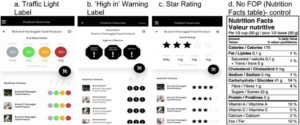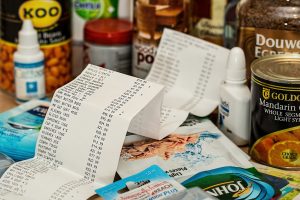Food choice behaviours are determined by social and environmental determinants (e.g. economic, physical and available information), but also by behavioural predispositions, personal experience with food, and person-related determinants (e.g. knowledge, attitudes, beliefs and values). With today’s obesity and chronic disease rates, studying consumer decision-making on food choices is critical.
Our goal is to better understand consumer food and nutrition knowledge, attitudes and behaviours (KAB) and dietary intakes, by administering online surveys to nationally representative samples of Canadian consumers.
STUDIES FROM OUR LAB
The L’Abbé Lab has administered numerous surveys and randomized mock package experiments to evaluate consumer perceptions of food, diet and health and understanding and use of nutrition information on food labels. For example, we have published journal articles on the following topics (see L’Abbe Lab Publications for a complete list):
- Sodium and health claims: We evaluated consumer attitudes and understanding of different types of sodium claims and the effect of having hypertension on responses to such claims.
- Claims and symbols: We assessed consumers’ implicit and explicit recall, understanding and perceptions of products with nutrition-related messages.
- Front-of-Pack logos and symbols: We evaluated 4 front-of-pack systems relative to the Nutrition Facts table with respect to consumer friendliness and their influence on perceptions of the healthiness and nutrient content of food.
- Restaurant foods: We determined whether sodium information on menus helps consumers make lower-sodium choices and to understand what other factors influence the effect of menu labelling on consumers’ meal choices.
- Sodium reduction interventions: We evaluated Canadians’ concern, actions, reported barriers, and support for government-led policy interventions aimed at lowering sodium intakes.
- Use of digital tools (e.g. smartphone apps): We examined consumers’ perceptions of different Interpretative Nutrition Rating Systems (INRS) for delivery of nutrition information using different versions of a smartphone app, FoodFlip©

App screenshots of FoodFlip© for each of the interpretative nutrition rating system (INRS): a Traffic Light Label, b ‘High in’ Warning Label, c Star Rating and d No Front-of-Pack (Nutrition Facts table (NFt) (Control; without healthfulness comparison feature))
Consumer Knowledge, Attitudes and Behaviours towards Sodium Reduction in the Food Supply
In 2012-2013, the L’Abbe Lab studied consumers’ knowledge, attitudes and potential behaviours with respect to reduced sodium products in Canada, supported by a grant from the Dairy Research Cluster (Dairy Farmers of Canada, Agriculture and Agri-Food Canada, Canadian Dairy Commission). Multiple surveys were administered to a nationally representative panel of Canadian adults including an experiment using imitation (“mock”) cheese packages to test consumers’ willingness to buy lower sodium cheeses. We found that Canadians lack knowledge about sodium, though many are concerned about their sodium intake and look for sodium reduced products. The mock package experiment revealed that it may be helpful to consumers if sodium claims (e.g. “low in sodium”) were placed on all packages that meet the criteria for those claims and if stakeholders supported educational campaigns centred on sodium. The experiment also revealed that consumers may also be willing to purchase lower sodium cheeses. Problematically, there is a perceived lack of availability of lower sodium cheeses in the marketplace.
The results from this study are presented in the following reports:
Phase 2 Final Report – Consumer Knowledge, Attitudes and Behaviours towards Sodium-Reduced Cheese
